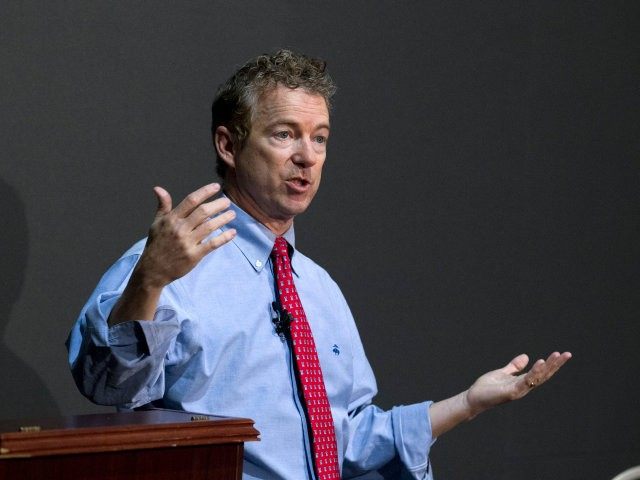AUSTIN, Texas — Though he hasn’t officially launched a presidential campaign, Sen. Rand Paul (R-KY) is taking steps that make it seem that’s likely forthcoming. He opened a new office via RAND PAC in here in Austin that will focus on building a communications technology infrastructure.
“People keep asking me why are you in Texas and not in New Hampshire?” Paul opened his remarks to a near capacity crowd in Capital Factory in downtown Austin—a hub of the Austin tech community. Austin, like Silicon Valley in California, is home to some of the world’s top entrepreneurs and technology leaders and innovators.
Paul chose to spend the past few days here rather than jousting back-and-forth with former Florida Gov. Jeb Bush and Wisconsin Gov. Scott Walker in New Hampshire, focusing on building up his campaign-in-waiting with some of the top talent in the business—focusing, therefore, on the long game of the campaign—and fighting to win over traditionally non-Republican constituencies at the South by Southwest conference.
“Well, because I think if you want talent you got to go where the talent is,” Paul said.
There’s a lot of Texans in town and a lot of brainpower here in the tech community. There’s 72,000 people visiting Austin who are full of ideas and innovations. One of the things I love about the tech community whether it’s here in Austin or in Silicon Valley is when I meet people they’re not waiting for solutions to come from government. They’re thinking up and creating the solutions to fix the problems on their own. I’ve been to Washington. Don’t wait for any solutions to come out of Washington.
Paul said he views technology as a tool: not an end-all-be-all solution, but a way to connect people with information.
“The way I see technology advancing us as we move forward is the connectivity to everybody with something extraordinary,” Paul said. “So for example, who’s the best explainer of physics in the whole country? Let’s connect him to every high school kid we have in our country.”
“Why am I here as a politician and potential candidate? Because we can use technology to reach out and spread our message in extraordinary ways,” Paul added.
Campaigning has changed dramatically. It used to be nine tenths of the money was spent on television. Now, we’re spending extraordinary amounts online finding people where they are. We’re also trying to find voters where they are and encourage them to come be part of the process.
Only half of the people in America are registered to vote. Only half of those registered to vote actually vote. In a primary, it’s maybe one in five registered for a particular party show up. Technology can help us find the people who might consider voting if they actually had something to believe in.
Paul warns, though, that new-age technology isn’t a substitute for running an ideas-driven campaign where people are attracted to what a candidate believes in.
“Technology is no magic cure, there’s no magic with meta data where you can somehow now win elections—you’ve got to have something to say,” Paul said.
But I think many people in the tech community as I meet them not only have the ability to help us find voters, but they are voters. There’s 72,000 of them here in town and as I talk to people in the tech community there are issues of privacy. They believe—as I do, I strongly believe—that we should not have the government looking at our stuff.
Paul also criticized the GOP establishment and Republican National Committee for their widely documented failures with “Project ORCA” during the Mitt Romney for president campaign in 2012, noting that Republican candidates can’t leave anything to chance moving forward.
“The Republican Party last go-around had a plan to sort of use technology to catch up to President Obama,” Paul said. “We didn’t quite get there. A little bit too little too late. We plan on getting organized at an early date, having an office here collecting the best minds in Austin and around the country and talking about how we can use technology to further the cause of liberty and freedom.”
At the South by Southwest conference this weekend, Paul toured various forms of new technology including drones, met with leaders of the innovative new fields, and worked to bring his message to various millennial and tech community leaders with several events, including a town hall hosted by Twitter. Paul is the only potential presidential candidate who spoke at the event, and is the only one who has launched as full-fledged a technology effort as he has.
Staffing the office for Paul will be Vincent Harris and Rachel Kania. Harris served as a staffer for Sen. Ted Cruz’s 2012 Senate campaign, working on digital for him before working for Senate Majority Leader Mitch McConnell’s 2014 reelection effort. He also works for Israeli Prime Minister Benjamin Netanyahu. Kania served as Cruz’s 2012 campaign primary state director.

COMMENTS
Please let us know if you're having issues with commenting.